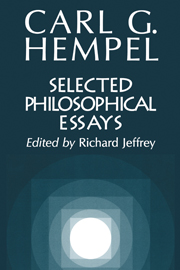Book contents
- Frontmatter
- Contents
- Preface
- Dates
- Introduction
- TRUTH
- PROBABILITY
- METHODOLOGY
- MEMOIRS
- Chapter 13 Rudolf Carnap: Logical Empiricist
- Chapter 14 The Vienna Circle and the Metamorphoses of Its Empiricism
- Chapter 15 Hans Reichenbach Remembered
- Chapter 16 Empiricism in the Vienna Circle and in the Berlin Society for Scientific Philosophy: Recollections and Reflections
- C. G. HEMPEL'S PUBLICATIONS
- Index
Chapter 13 - Rudolf Carnap: Logical Empiricist
Published online by Cambridge University Press: 05 June 2012
- Frontmatter
- Contents
- Preface
- Dates
- Introduction
- TRUTH
- PROBABILITY
- METHODOLOGY
- MEMOIRS
- Chapter 13 Rudolf Carnap: Logical Empiricist
- Chapter 14 The Vienna Circle and the Metamorphoses of Its Empiricism
- Chapter 15 Hans Reichenbach Remembered
- Chapter 16 Empiricism in the Vienna Circle and in the Berlin Society for Scientific Philosophy: Recollections and Reflections
- C. G. HEMPEL'S PUBLICATIONS
- Index
Summary
Rudolf Carnap was the leading figure among the originators and the moving spirits of the stream of philosophical thought known as logical positivism or logical empiricism. Carnap preferred the latter name: The appellation “empiricism” rather than “positivism” was to set the movement apart from earlier forms of positivism, and the term “logical” was to call attention to the great importance this new empiricism attributed to the concepts and methods of contemporary logic as tools of philosophical analysis.
In Carnap's work, logic loomed large not only as a tool but also as a subject of philosophical investigation. A great deal of his research was devoted to problems in logic and metalogic, including the fields of logical syntax and semantics; the results of this work comprise substantial contributions to deductive logic as well as the most comprehensive and rigorous system of inductive logic yet devised.
The papers of my colleagues on this symposium address themselves to Carnap the logician; let me, therefore, attempt a brief appreciation of Carnap the logical empiricist philosopher.
Carnap's work outside the field of logic was devoted almost exclusively to epistemology and the philosophy of science, and his principal contributions to these fields are united by a common leitmotiv – namely, the search for ever more careful and philosophically illuminating reformulations, or explications, of the basic idea of empiricism that all our knowledge of the world ultimately derives from what is immediately given to us in the data of our direct experience.
- Type
- Chapter
- Information
- Selected Philosophical Essays , pp. 253 - 267Publisher: Cambridge University PressPrint publication year: 2000

